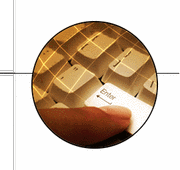THE E-TRAIN LEARNING SYSTEM
THE WORLD IS F-A-T! Fast, Accessible and Temporary
The Academy stands on the precipice of utter overhaul. In many segments of higher education, the paradigms are shifting and the foundations of modern educational philosophy (seat-based, time-based, scope and sequence curricula) are already fading. The emergence of the Internet has created a new cyber world that is completely rearranging major industry, including business, politics and educational institutions.
In a cyber-world, life is timeless, wall-less and seamless. Thomas Friedman, in his work The World Is Flat, revealed how web technology is unequivocally ending hierarchical structures of authority. Information is now at the fingertips of the average person and whole bodies of knowledge are being digitized for user consumption. The popularity of social networking sites (Facebook, MySpace) reveal how the younger generation is wired naturally for this cyber-world and institutions that recognize these new frames will have a cutting edge advantage.
Many modern learning institutions have recently discovered the value and profit in electronic learning and web-communications. Unfortunately, most continue to pour this “new wine” into “old” educational “wineskins” (e.g., time-based learning, video professor instruction, test-driven evaluation). Because these strategies seem “normal” to many within the modern educational arena, the suggestion of other frames can seem odd, unnecessary or inferior. But just like the printing press created a new world (from which the modern university system emerged), so will the Internet. To fail to acknowledge this technological innovation could prove as disastrous as the fading of monastic education during the Renaissance. New technology creates new cultural languages and new cultural dialects unleash new opportunities.
HOW E-TRAIN WORKS...
E-learning creates a dynamic relationship between the student and professor/institution that continues beyond the class. It is marked by several format elements:
· Experiential Learning: Students learn not from a book, but from actual life experiences (forged through projects) in the subject matter. Course projects would require involvement of the student (under supervision) in the learning objectives. Consequently, learning would become performance-based in context, not cognitive-based (meaning there would be no need for tests to evaluate). Students remember more of what they do so, consequently, retention and understanding will rise exponentially.
· Interactive Learning: Students, in every course, would have several relationships. One relationship would be with a primary professor who guides the whole class experience during that semester. This professor would be a recognized expert in the field of the course and would set up chat room discussions, interact on the discussion board, approve Learning Plans, evaluate submitted projects and issue the final course grade. Each student would also have a ministry mentor of their choosing. This individual would interact weekly with a student to complete the tasks and course projects. A third individual will serve as a fieldwork supervisor to evaluate on-the-field work and communicate with the primary professor concerns, completion of tasks and/or comments. Finally, students through chats, discussion boards and the meetings at the National Youth Workers Convention would learn from each other and with each other.
· Resource Learning: In a digital age, the critical issue is not to control information dispensation (lectures, classroom situations) but rather how to critically think about the information available. Higher order thinking skills (analysis, synthesis and evaluation) are of more importance than cognitive recall, understanding and application. E-learning creates a resource depository for the student. Each student, from their first course, would develop a personal website that uploads information on youth and family ministry (links, blogs, resources). This would be an ongoing project throughout the degree program and each course would require additional uploads. Personal websites that show exceptional value, upon graduation, would be linked to an instituion’s website and recommended to others. Students would also build a personal library in youth and family ministry. Each course would have a two book requirement (primary professor lists these) and an additional 500 pages of reading in other books related to the course content (student-selected). Students would interact on the course discussion board to the primary reading assignments and on their personal websites write a brief reaction to the other works (500 pages) they read in that course.
· Mentored Learning: E-learning works best through mentored relationships. Mentoring is personal and purposeful. The primary professor guides the whole class. The ministry mentor is a student-selected resource (that is currently in the field of ministry) for interaction. A student may select ANY ministry mentor who agrees to serve as their course mentor. They may never meet personally in the course and can be purely available through an “e-relationship” (e-mail, phone). The “field supervisor” (who may not serve as the ministry mentor) is the only one who observes the student on the field. Evaluations of the student will come from all three (primary professor, ministry mentor and field supervisor). One key would be a “pass/fail” nature to the course. Each professor would evaluate the student’s work in a particular area: Primary Professor (submitted projects (quality of B-level or better), chat/discussion board involvement, personal website development, reading), Ministry Mentor (interaction and awareness of the student with the subject matter) and Field Work Supervisor (ability to complete on-the-field course projects). Each professor/instructor/supervisor would grant a “thumbs up/thumbs down” for the work of the student that semester. A passing evaluation (B/90 or better) means the student continues on. A failing evaluation means the student must re-engage in the course for another semester, perhaps with the need to repeat certain course projects.
· Continual Learning: E-learning doesn’t end when the class does (as with the traditional model of correspondence courses). Rather the older students become guides for the younger ones. Each week students may gather for a chat room dialogue (1 hour) with other students in the program. Chats (depending on the Primary Professor) may be scheduled for up to three times a week and announced at the course website. Students will be expected to make a chat at least once a month to discuss course material. Chats may also include notable guests and ministry experts.
· Self-Styled Learning: While the primary professor will guide the learning and course overall, each student will write a “learning plan” (to be submitted to the primary professor) within the first two weeks of entering a course (which lasts until the student completes the projects). This learning plan will detail what the student intends to do to engage in the learning of the course objectives, including intended projects, additional reading and personal website development. The primary professor will read and affirm these learning plans or suggest further development and improvements. All students will post their learning plans at the discussion board by the end of the first month. At the end of the course, each student will also write a 1000 word document that outlines their reaction to their learning plan and any personal insights and applications. This document will also be evaluated by the primary professor and posted at the website.
INTERESTED IN E-TRAIN COURSES??? Write rickchromey@juno.com and request syllabi, brochures and sample degree programs!
At this point, students may engage in THREE different options in E-TRAIN: Associate of Science (Youth Ministry), Associate of Science (Children’s Ministry) and Master of Arts (Youth Ministry). Institutions may buy wholesale into the degree (which at this point, only contains the 28 hours of Church Ministry core) and students who earn these credits plus the necessary general education and Bible/Theology core may graduate from the institution. Institutions may also choose to simply transfer in various E-TRAIN courses into their school. Consequently, their original degree programs are retained and E-TRAIN courses are simply one more option within the educational course constellation.
Students may take an E-TRAIN course simply by registering with their respected school. They may not take more the twelve hours (12) of E-TRAIN courses at any one time. The Primary Professor (at this point, only Rick Chromey) will essentially serve as an “adjunct” professor for the institution and will provide schools with a full transcript of education, plus any other pertinent documents necessary for accreditation purposes.
A student is considered officially enrolled when they register and, consequently, payment (to Rick) is due within 30 days of registration. All students, once they register, will contact Rick for a current syllabus and a course website “key.” A student is “official” once they enter the website and submit their Learning Plan (within two weeks of registration) to the Primary Professor. Institutions that do not pay on time will be assessed a 5% late fee per month. The final grade will not be issued for the student until payment is made.
Institutions wishing to contract with E-TRAIN and Rick Chromey may enter into an agreement at any time (and its recommended that they advertise to their students that E-TRAIN courses are not limited by semester registration time frames but rather can be entered at any time the student wishes.
E-TRAIN will retain 50% of the current institution’s tuition dollar for each student enrolled in an E-TRAIN course, while the institution will retain 50% as educational profit. In the event a student must seek a continuance of a course (after one year), they must pay a $250 continuance fee to the institution and supply the Primary Professor with an update of their progress. This fee will be split 50/50 between the Primary Professor and the Institution. No final grade will be issued if this fee is not paid.

